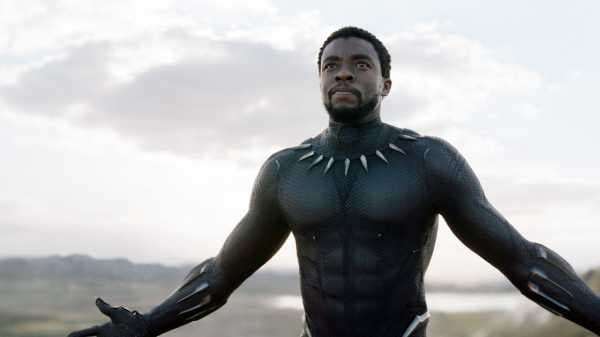
What’s remarkable about “Black Panther” is not just that the very act of
making a high-budget franchise superhero film with a cast of mainly
black actors is so woefully exceptional. It’s that, despite the
technical requirements of a superhero film (and, no doubt, despite the
supervision of Disney’s producers), the director, Ryan Coogler, who
co-wrote the script with Joe Robert Cole, has made a movie that’s both
personal and audacious. “Black Panther” fuses the imaginary realm of
Marvel characters with world history, contemporary politics, and
specifically the experience of black people in the United States. Many
Marvel releases reflect American political turmoil of the moment, but
this film’s confrontations with the agonies of the day are unusually
complex and resonant.
The film’s action follows that of “Captain America: Civil War,” from
2016, in which T’Chaka (John Kani), the king of the imaginary African
land of Wakanda, is killed in a terrorist attack on a United Nations
complex in Vienna. In “Black Panther,” T’Chaka’s son, T’Challa (Chadwick
Boseman), returns to Wakanda to assume the throne. One of the great
virtues and pleasures of “Black Panther” is its coherent and intricate
world-building—it delivers a history of Wakanda that feels less like an
exposition than like a discovery. The movie’s backstory, dispensed in
two big sequences, is intensely dramatic in itself. The first of these
sequences establishes Wakanda, a landlocked country in eastern Africa,
as home to Earth’s sole supply of vibranium, the world’s strongest
metal, which is endowed with a potentially devastating power of its own.
Wakanda has isolated itself in order to protect its stores of
vibranium—and to protect itself from the invasion or the enticement of
would-be colonizers—but its rustic landscapes conceal, with the help of
holograms, its mighty technological sophistication. The second backstory
reveal takes place in Oakland (Coogler’s actual home town), in 1992,
where a Wakandan prince, N’Jobu (Sterling K. Brown), is stationed.
Witnessing the burdens borne by black Americans, he decides to
distribute his country’s vibranium and weaponry worldwide, in an effort
to aid a revolution against white-dominated powers. N’Jobu’s brother
T’Chaka, then the King of Wakanda, thwarts the effort, kills N’Jobu, and
covers up the plot. But the prince, who is married to an American woman,
has a son with him, a young boy who grows up to challenge T’Challa for
the Wakandan throne.
But, before that takes place, T’Challa returns home to Wakanda,
where—following the long-standing tradition for the country’s royal
succession—he must accept a challenge from a pretender to the throne in
the form of hand-to-hand combat. After T’Challa prevails, he takes his
ex-partner, the warrior and humanitarian Nakia (Lupita Nyong’o), and the
Wakandan general Okoye (Danai Gurira) on a mission to South Korea. Their
aim is to prevent the illicit transfer of vibranium, which has been
stolen by a young man (Michael B. Jordan) who’s playing a long game. His
name is Erik Stevens, a.k.a. Killmonger—and he’s the son of N’Jobu, the
prince who was killed in Oakland. A brilliant student and a former U.S.
Special Forces soldier, Erik has been preparing for this moment for all
his life. After an explosive series of battles, Erik goes to Wakanda
seething with anger and seeking revenge; he challenges T’Challa for the
throne, and, after a fierce and bloody fight, which he wins, he demands
of the country’s despairing guardians to be crowned king.
Killmonger’s purpose in taking over Wakanda is more than just revenge,
however: he seeks to fulfill his father’s self-appointed mission in an
even more radical form. Killmonger plans to distribute vibranium to
Wakandan “war dogs” embedded in countries around the globe. With their
help, Wakanda would overthrow the world’s existing governments, correct
the historical error and injustice of white domination, redress the
oppression of the world’s black people, and create a Wakandan empire on
which “the sun will never set.” In pursuing his mission, Killmonger
wields his power cruelly against Wakandans, as well. In response,
T’Challa, Nakia, and T’Challa’s sister, Shuri (Letitia Wright), who is
Wakanda’s leading scientist, seek, in a quiet but determined plan, to
overthrow him.
The symbolic dimensions of “Black Panther” are ample and powerful.
Wakanda evokes a prelapsarian Africa, free of Western colonial
devastation: the country’s resources are unplundered, its chain of
tradition is unbroken, its cultural heritage is fully realized, and its
technological achievements embody both the country’s material and
intellectual resources. The blend of classical arts of African origin
with high-tech wonders, of warmly vital skyscraper cities of African
inspiration (rendered in eye-catching production design by Hannah
Beachler), suggests a popular version of Afrofuturism—even if the
soundtrack, with its vibrant songs by Kendrick Lamar, doesn’t suggest
much of Sun Ra’s extravagances (it would have been fun to catch a bit of
the Wakandan avant-garde).
Coogler, who previously directed
“Creed,”
his 2015 reboot of the “Rocky” series, has a distinctive mode of
dramatic inspiration: he catches the existential struggles of life and
death in quiet moments of intimate confrontation. That artistry itself
is more than just emotional; it both reflects and bitterly criticizes an
inescapable aspect of American life. In a flashback, Killmonger recalls
a conversation, in Oakland, in which he told his father, N’Jobu,
“Everybody dies, it's just life around here.” But that, of course, is no
way to have to live. Here and elsewhere, Coogler dramatizes, clearly and
relentlessly, the air of oppression—constant menace from police
violence, from conditions of occupation and degradation—and of
intentional cultural and economic deprivation and systematic
powerlessness, arising from a pressurized atmosphere of deadly hatred
that strips the fullness of life to the starkness of survival.
The temptation of black radicalism, of taking up arms against oppressive
white-supremacist powers, is present in “Black Panther.” But its heroes,
though entirely sympathetic to the needs and demands of the oppressed,
reject it, favoring improvement over revenge, a quest for justice over a
new round of injustices. They do so not merely out of the goodness of
their hearts. Rather, if the heroes of Wakanda reject the revolutionary
radicalism of Killmonger, it’s because they see it as merely the obverse
of the white radicalism that’s in real-life power now. (A series of
suggestions scattered throughout the movie reinforce that implication
all the more.)
Having obtained power, the cruel and brutal Killmonger has no intention
of relinquishing it—ever. The age-old process of royal succession
depends on the use of a blue, glowing “heart-shaped herb” that’s
cultivated in a quiet corner of the kingdom. Killmonger orders it
destroyed, because he intends to be, in effect, the last King of
Wakanda. Killmonger is the personification of democratic perversion, an
autocrat who’s elected according to the rules of the game but who then
changes the rules to maintain a stranglehold on power. T’Challa tells
him, “Your heart is full of hatred; you’re not fit to be a king,” and
tells Nakia that Killmonger “is a monster of our own making.” (There’s
an element of backstory that I don’t want to spoil that explains how
literally this is true.) Though T’Challa, Nakia, and Shuri—along with
T’Challa and Shuri’s mother, Ramonda (Angela Bassett)—unhesitatingly
exile themselves from their tyrannized homeland and prepare for armed
conflict against it, the crux of the drama isn’t their allegiance but,
ultimately, that of the general Okoye: whether she will remain true to
her oath to serve the throne of Wakanda, whoever may occupy it, or
whether she’ll decide that her love of country requires her to rebel.
In “Black Panther,” Coogler isn’t just posing a question to black
activists; he’s posing a challenge to Wakandan officials and
institutions. Which is to say, to American officials and institutions,
as well. First, the film evokes a moment of crisis, when duty and
conscience may make disloyalty to one ruler and his regime a matter of
higher loyalty to the country and the state. Second, it raises the
question of political process, its inadequacy, its failure. The Wakandan
tradition of a physical battle that decides who occupies the throne may
have worked just fine for centuries, when the goodwill of all
challengers could be assumed, but the system is vulnerable to the
manipulation of a strongman whose prime claim to power is strength. It’s
a system that may have worked once, but in a modern technocracy there
are virtues besides the ability to win a hand-to-hand fight that a ruler
would need.
There’s a tag scene, midway through the end credits of “Black Panther,”
showing T’Challa addressing the U.N. about Wakanda’s new deal: his plan
to share his country’s knowledge and resources with the world. (He
concludes with a line of pointedly current import: “The wise build
bridges, while the foolish build barriers.”) In the inevitable sequel, I
wouldn’t be surprised if the venerable process of transitions of
power—the very essence of Wakanda’s institutions—weren’t transformed to
go hand in hand with the nation’s transformed place in the world.
Sourse: newyorker.com






